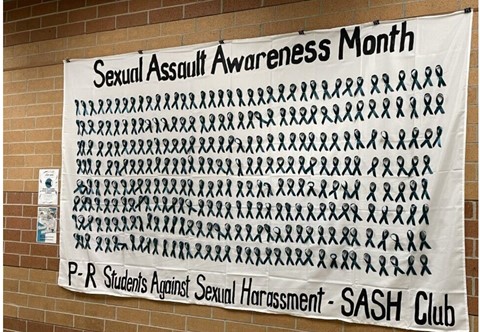For millions of students, back-to-school means back to the daily barrage of sexual harassment and assault that compromise their learning and well-being.
- New York City Schools recently settled a $700,000 lawsuit brought by four survivors of color with disabilities.
- In Baltimore, students walked out of class demanding the district address sexual assault allegations.
- Near Pittsburgh, parents formed an alliance to address their district’s mishandling of reported sexual assault.
- A federal lawsuit charged Northwest Arkansas school district with disregarding athletes’ sexual abuse of students.
- A California school district paid $11 million to settle a lawsuit on behalf of survivors of sexual abuse.
- Berkeley, CA, students forced a reckoning following decades of abuse.
The list goes on and on.
Like most parents, sexual harassment and assault at school weren’t on my radar until our daughter was sexually assaulted on a high school field trip. That event derailed her education, threw our family into chaos, and changed the trajectory of our lives. After bringing a high-profile federal investigation to the Seattle school district for violating her Title IX rights and hearing from countless families whose students were harassed and assaulted at school nationwide, we established the first nonprofit specifically devoted to K-12 sexual harassment and assault, Stop Sexual Assault in Schools (SSAIS).
Speaking in the media and through the #MeTooK12 campaign, SSAIS raised awareness about the normalization of traumatic K-12 sexual harassment and assault. We learned that at least 81% of students in grades 8-11 reported experiencing sexual harassment, and 87% of them said it had a negative effect, 56% of girls, 40% of boys, and 75% of transgender students in K-12 are sexually harassed, at least 20% of school-aged girls, 3% of school-aged boys experience sexual battery, assault, or rape, and how girls of color are disproportionately affected by sexual harassment. It’s estimated that at least 10% of K-12 students are victims of educator/staff sexual misconduct.
Back in 2016, SSAIS was blazing new territory, helping parents navigate their student’s assault, and educating the media in reports like “Sexual violence isn’t just a college problem. It happens in K-12 schools, too.” We laid out the problems and solutions in the extended student-focused video featuring national experts, “Sexual Harassment Not in Our School!” We provided an abundance of new resources, worked with lawmakers and opposed the U.S. Department of Education’s 2020 dangerous Title IX rule. We raised awareness about the critical role of the Title IX Coordinator (tasked with creating gender equity but often inadequately trained) and provided guidance on implementing the convoluted 2020 rule.
SSAIS regularly hears from parents, teachers, counselors, and students about the ways their school engages in denial, victim-blaming, retaliation, and more rather than addressing the harassment. Parents feel betrayed because the harassment compromises or derails their student’s education and emotional well-being. Unfortunately, many parents and school staff believe the harassment only impacts the relatively small number of students who actually report it. No, the harassment bleeds into the entire school community because students who witness or hear about it also become anxious. Sexual harassment is a community problem.
Change isn’t coming fast enough to protect youth from sexual harassment and assault. But there’s something we can all do right now. There’s a new resource called SASH Club (Students Against Sexual Harassment). Its website offers free resources to empower youth ages 13+ to address the impact of sexual harassment and assault in their schools, communities, and personal lives. SASH Club resources provide ready-to-use inclusive peer-to-peer education for school clubs, youth-serving organizations, individual use, and more.
SASH Clubs are respectful and supportive environments where youth learn, ask questions, share opinions, and plan activities appropriate to their school or community. They can choose from downloadable presentations designed to inform, stimulate discussion, and inspire action. These include compelling topics such as healthy relationships, boundaries and consent, teen dating violence, definitions of sexual harassment and assault, what to do if sexually harassed or assaulted, alcohol and date rape drugs, rape culture and victim blaming, sextortion, confidentiality, Title IX, supporting LGBTQ+ students, activism basics, and more.
Youth can easily start a chapter in their school or community. A start-up guide includes downloadable forms, guidance for adult mentors, and suggested activities. Anyone can start a SASH Club chapter or freely download any of the SASH Club materials without starting a chapter. The How to Start a SASH Club Guide also appears in the American Federation of Teachers Share My Lesson collection.
Share SASH Club information with students and their allies, families, schools, youth-serving and community organizations, faith-based groups, scouting organizations, youth leaders, sexual assault crisis organizations, school clubs, teachers, school staff, Title IX Coordinators, influencers, and beyond.
SASH Club offers a powerful antidote to the culture of normalized sexual harassment and assault that plagues students every day. Youth have the potential to drive change, and with SASH Club’s resources and structure, they can make all learning spaces safe and equitable for all students. Lend your help today!

A year-long pilot of SASH Club at Pine-Richland High School included an impressive four-week campaign during Sexual Assault Awareness Month.
For questions or comments please contact SSAIS or SASH Club via
[email protected] or [email protected].
SASH Club is a project of the national nonprofit Stop Sexual Assault in Schools.










